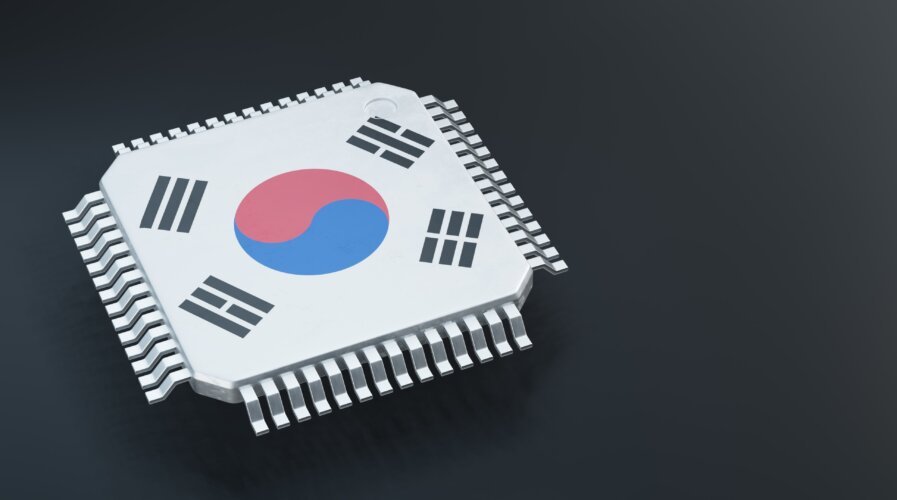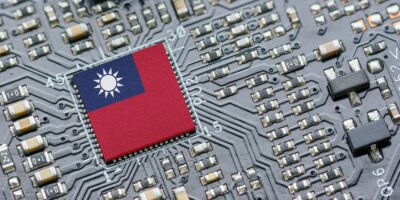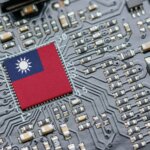
(Source – Shutterstock)
Can a South Korean startup take on Nvidia in the AI chips market?
- Rebellions Inc, a South Korean startup, has launched an AI chip, ATOM, to win government contracts and challenge global leader Nvidia Corp.
- The South Korean government is investing more than US$800 million over the next five years for R&D to lift the market share of Korean AI chips in domestic data centers from zero to 80% by 2030.
- Rebellions’ ATOM is designed to excel at running computer vision and chatbot AI applications, consuming only about 20% of the power of an Nvidia A100 chip on specific tasks.
In the last decade, Nvidia Corp., the US chip-making giant, has evolved from just a designer of graphical processing units (GPUs) used for video games to becoming an artificial intelligence (AI) powerhouse. Today, the company controls the AI chip market, with some analysts estimating its global share to be 80%. This dominance powers AI applications ranging from autonomous cars to robots to crypto mining.
Some data suggests that Nvidia has virtually no competition in its dominant chips. MLCommons, the industry consortium that oversees the popular machine learning performance test MLPerf, says that in three years, Nvidi has only had one competitor: CPU giant Intel. Additionally, since generative AI has been the talk of the town lately, rapid growth from ChatGPT usage, according to Citigroup Inc., could result in Nvidia sales of between US$3 billion and US$11 billion over the next 12 months.
In short, Nvidia will undoubtedly be one of the biggest beneficiaries of the AI “arms race” triggered by OpenAI’s ChatGPT. Moreover, the US chip designer has a commanding share of high-end AI chips, accounting for about 86% of the computing power of the world’s six largest cloud services as of last December, according to Jefferies chip analyst Mark Lipacis. Reaching Nvidia’s level would take years, even with the rapid pace of technological progress.
However, a company in South Korea is poised to give Nvidia a run for its money, particularly in AI chips. To begin with, the South Korean government aims to create a market that can be a testing ground for AI chipmakers to foster global competitors. The government plans to invest more than US$800 million over the next five years in research and development.
The aim is to increase the market share of Korean AI chips in domestic data centers from nearly zero to 80% by 2030. In 2020, the country’s information and communications technology regulator even announced plans to develop up to 50 types of AI-focused system semiconductors by 2030, Yonhap News Agency reported. The government will seek out thousands of local experts to lead this new wave of innovation.

Rebellions Inc, a South Korean startup, launched an AI chip, ATOM, to win government contracts and challenge global leader Nvidia Corp.
Locally made AI chips, starting with ATOM
In line with the country’s goal, a Korean startup, Rebellions Inc., launched an AI chip recently in an effort to win government contracts. Known as ATOM, the chip represents the latest Korean attempt to challenge global leader Nvidia Corp. in the hardware that powers AI technology.
According to a report by Reuters, Rebellions’ ATOM chip is designed to excel at running computer vision and chatbot AI applications. “As it targets specific tasks rather than doing a wide range, the chip consumes only about 20% of the power of an Nvidia A100 chip on those tasks,” the report stated, quoting Rebellions co-founder and chief executive Park Sunghyun.
Nvidia’s A100 is the most popular chip for AI workloads, and is powerful enough to “train” AI models, as it is commonly known in industry jargon. ATOM, on the other hand, designed by Rebellions and manufactured by Korean giant Samsung Electronics Co., does not do training. “The government is twisting the arm of data centers and telling them, ‘Hey, use these chips,'” Park added.
Without such support, he said, data centers and their customers would likely continue to use Nvidia chips. Gartner’s analyst Alan Priestley mentioned that there has been a lot of momentum behind Nvidia’s developments, which it will take time for startups in South Korea to build. According to an official at the Ministry of Science and ICT in South Korea, Seoul will be issuing a notice this month for two data centers, referred to as neural processing unit farms, and only domestic chipmakers will be allowed to bid.
Sapeon Korea Inc., the first Korean company to develop an AI chip, also plans to participate in the project, according to SK Telecom Co subsidiary. FuriosaAI, a South Korean AI-powered chip design house, will also be bidding. Meanwhile, Rebellions will attempt to participate in the government project as part of a consortium with KT Corp, a major Korean telecom, cloud, and data center operator, with the aim of winning customers away from Nvidia’s US supplier.
“Amid high dependence on foreign graphics processing units (GPUs) globally, the cooperation between KT and Rebellions will allow us to have an ‘AI full stack’ that encompasses software and hardware based on domestic technology,” KT vice president Bae Han-Chul noted.
READ MORE
- Ethical AI: The renewed importance of safeguarding data and customer privacy in Generative AI applications
- How Japan balances AI-driven opportunities with cybersecurity needs
- Deploying SASE: Benchmarking your approach
- Insurance everywhere all at once: the digital transformation of the APAC insurance industry
- Google parent Alphabet eyes HubSpot: A potential acquisition shaping the future of CRM


